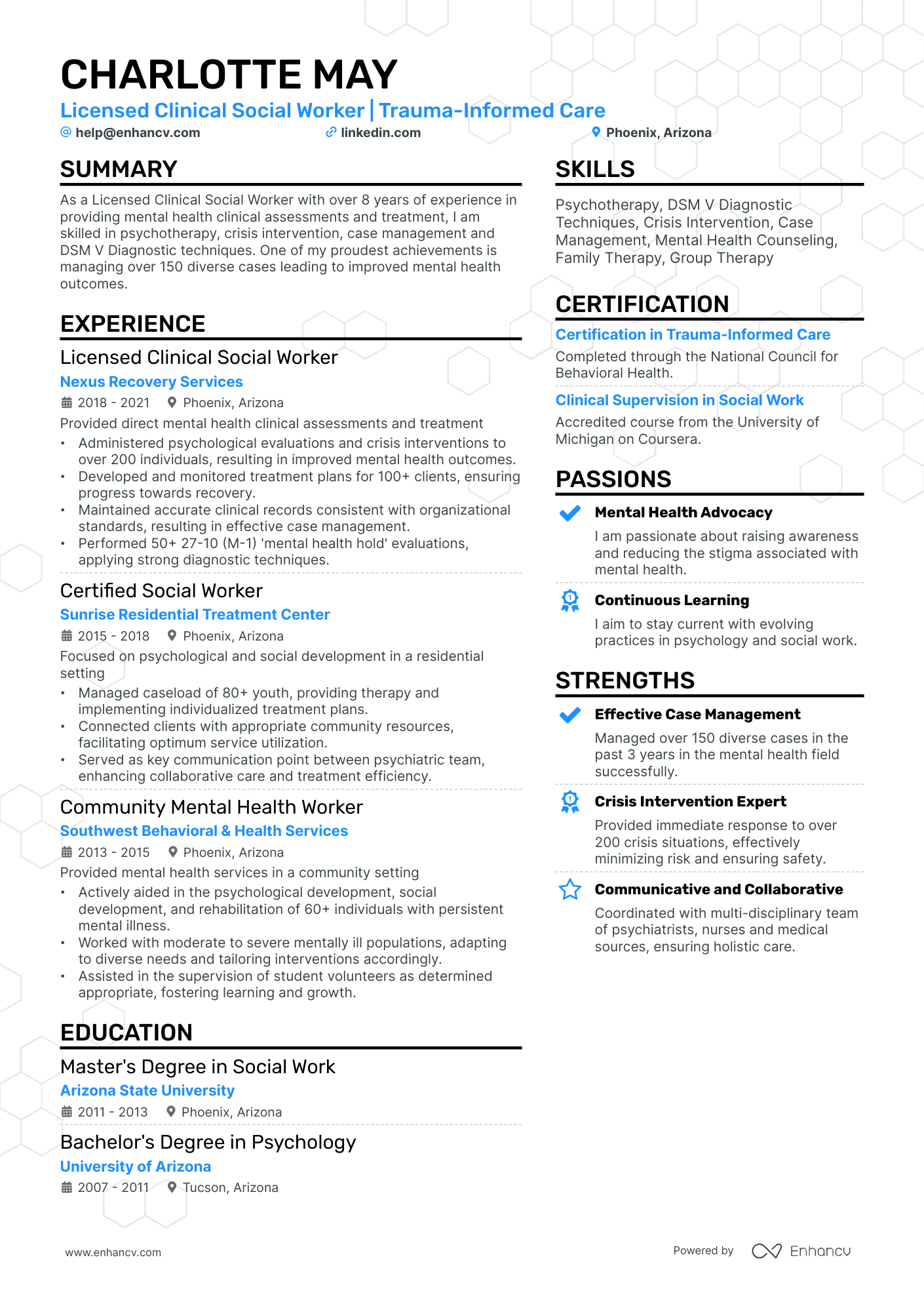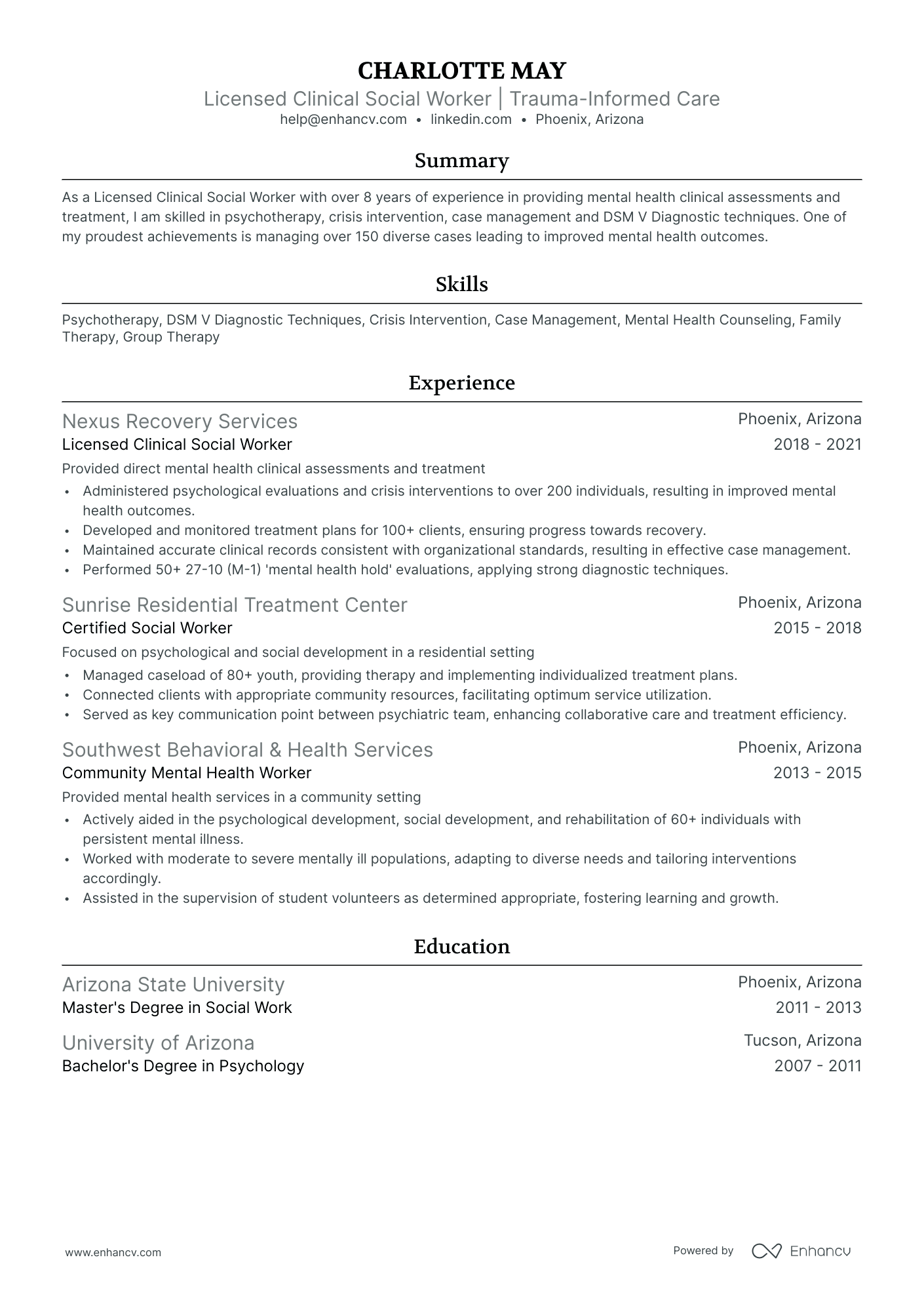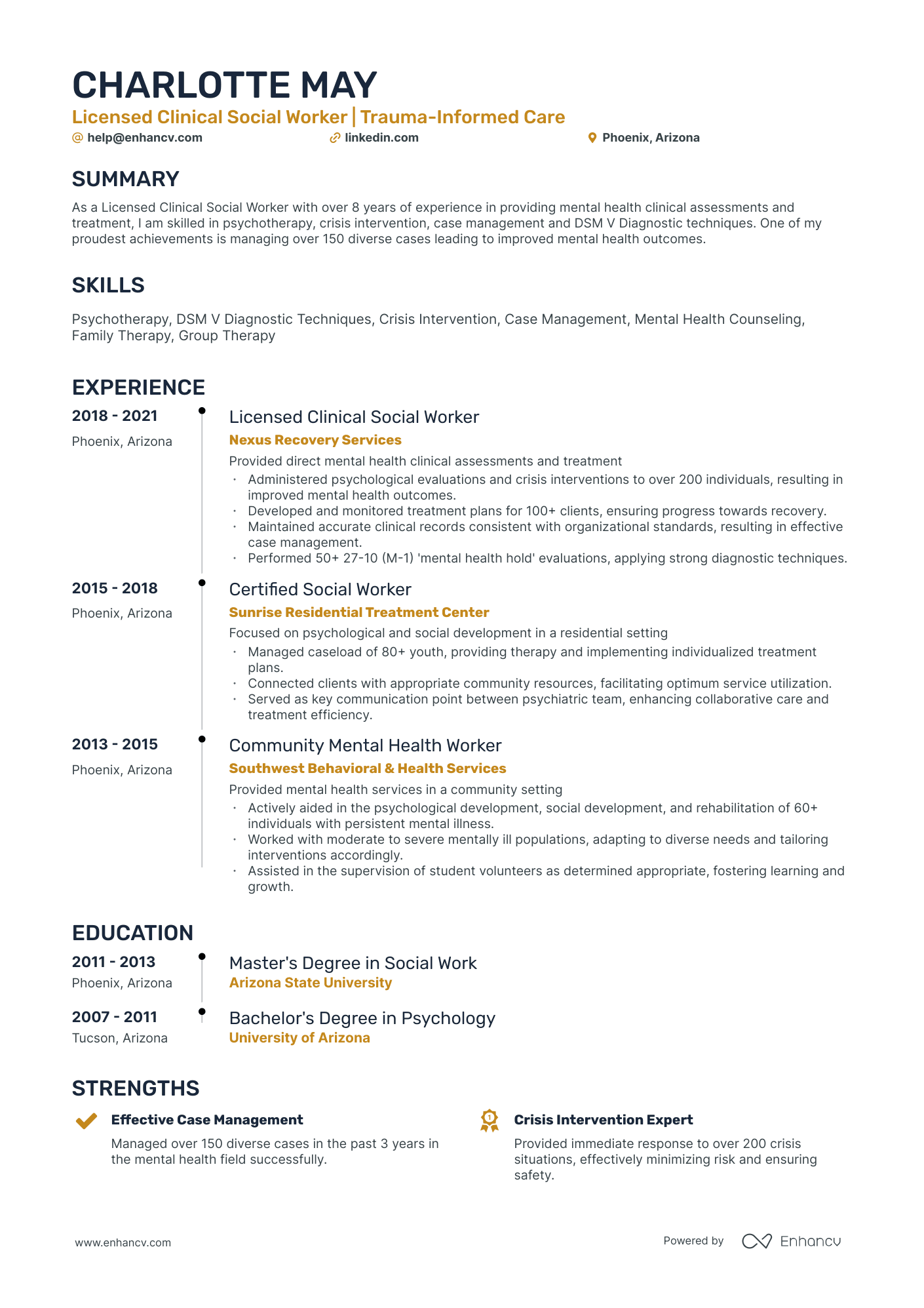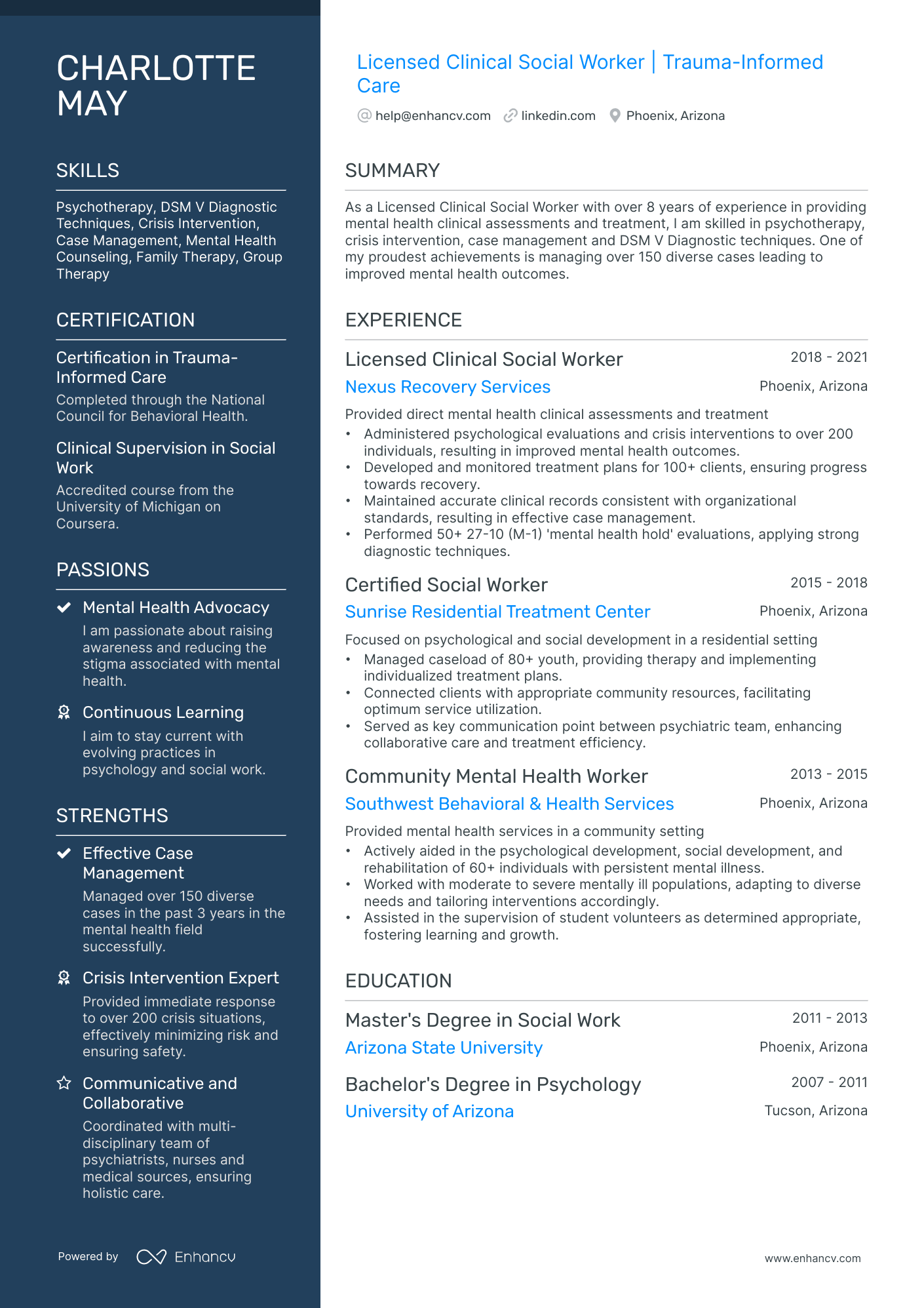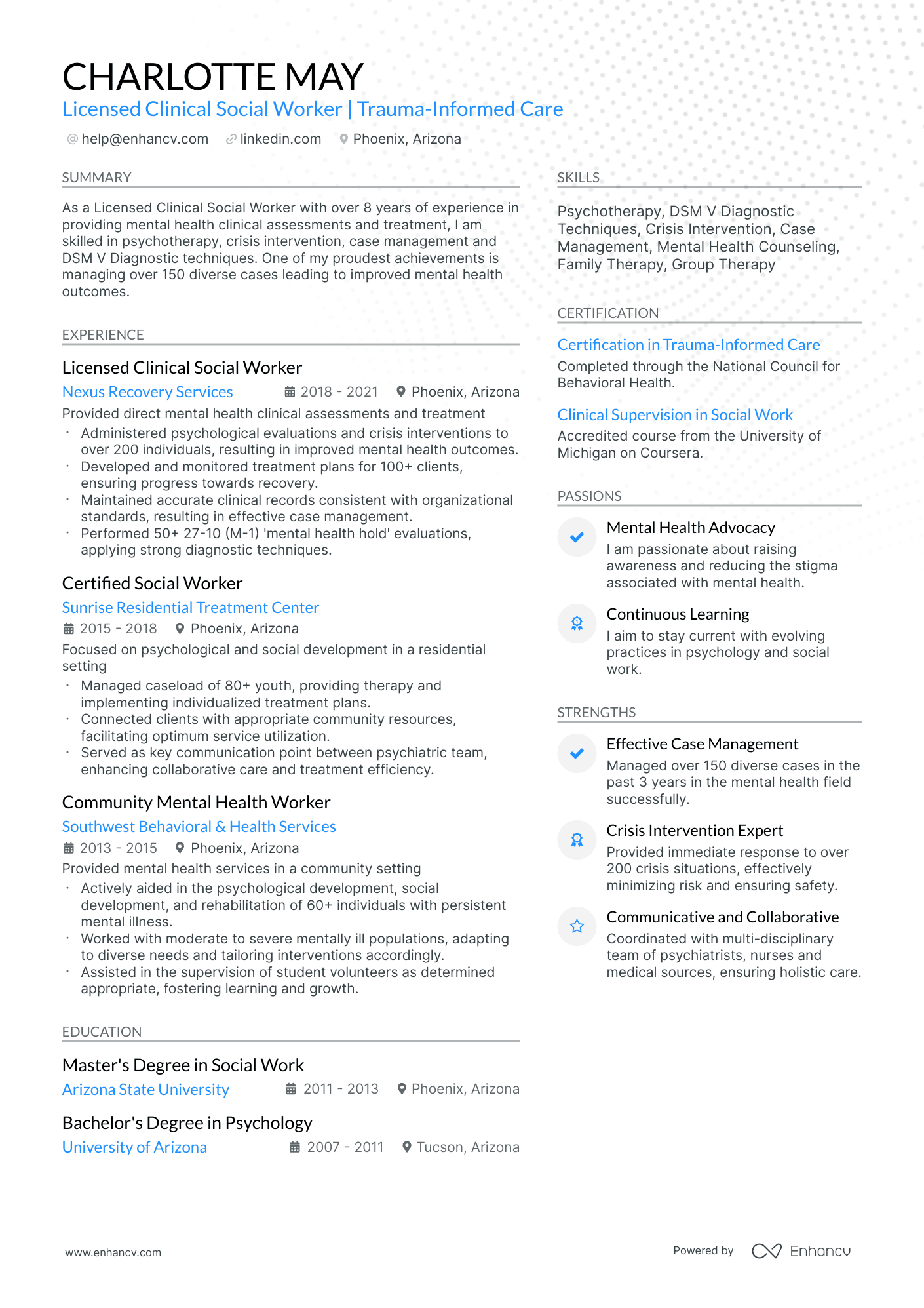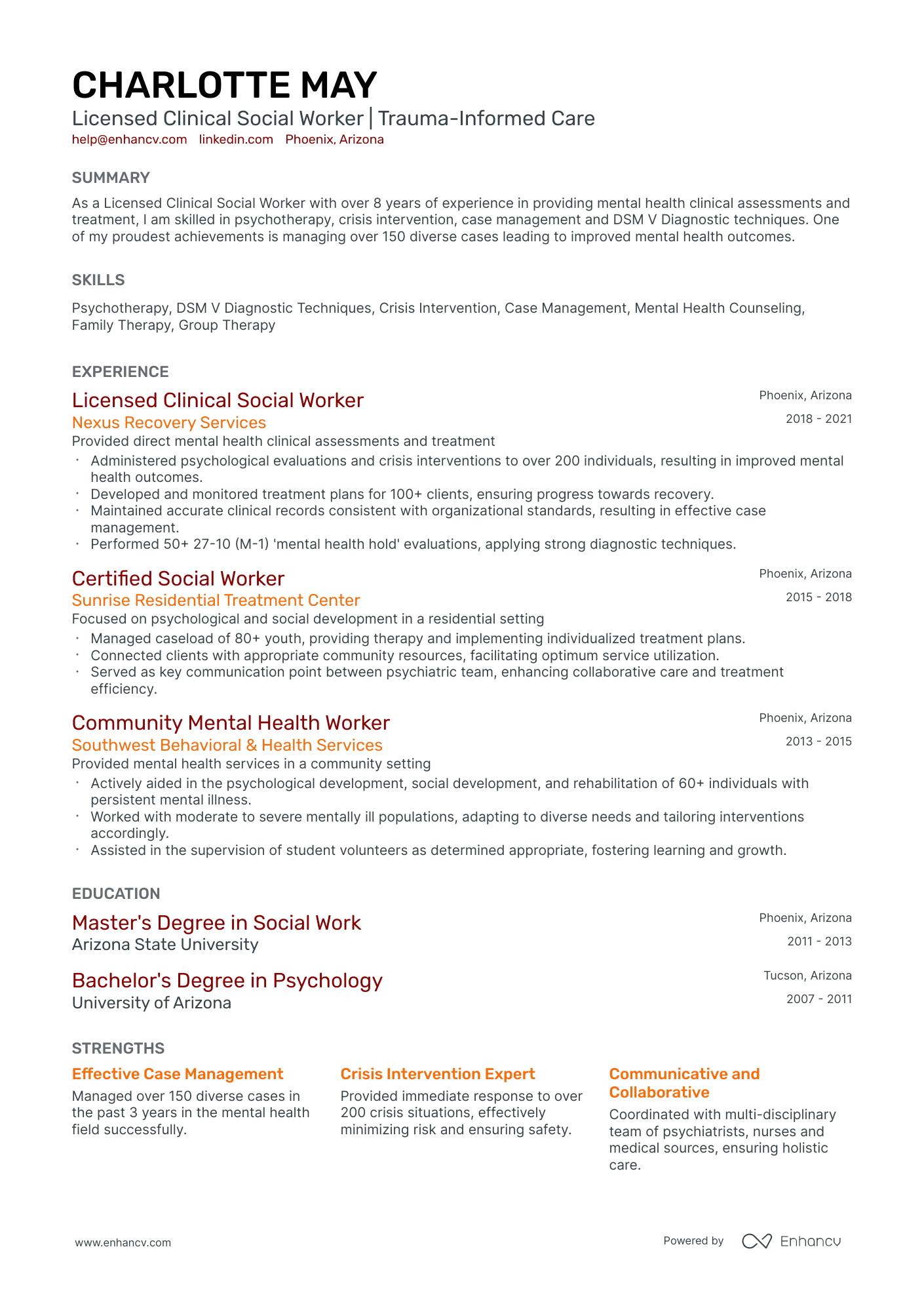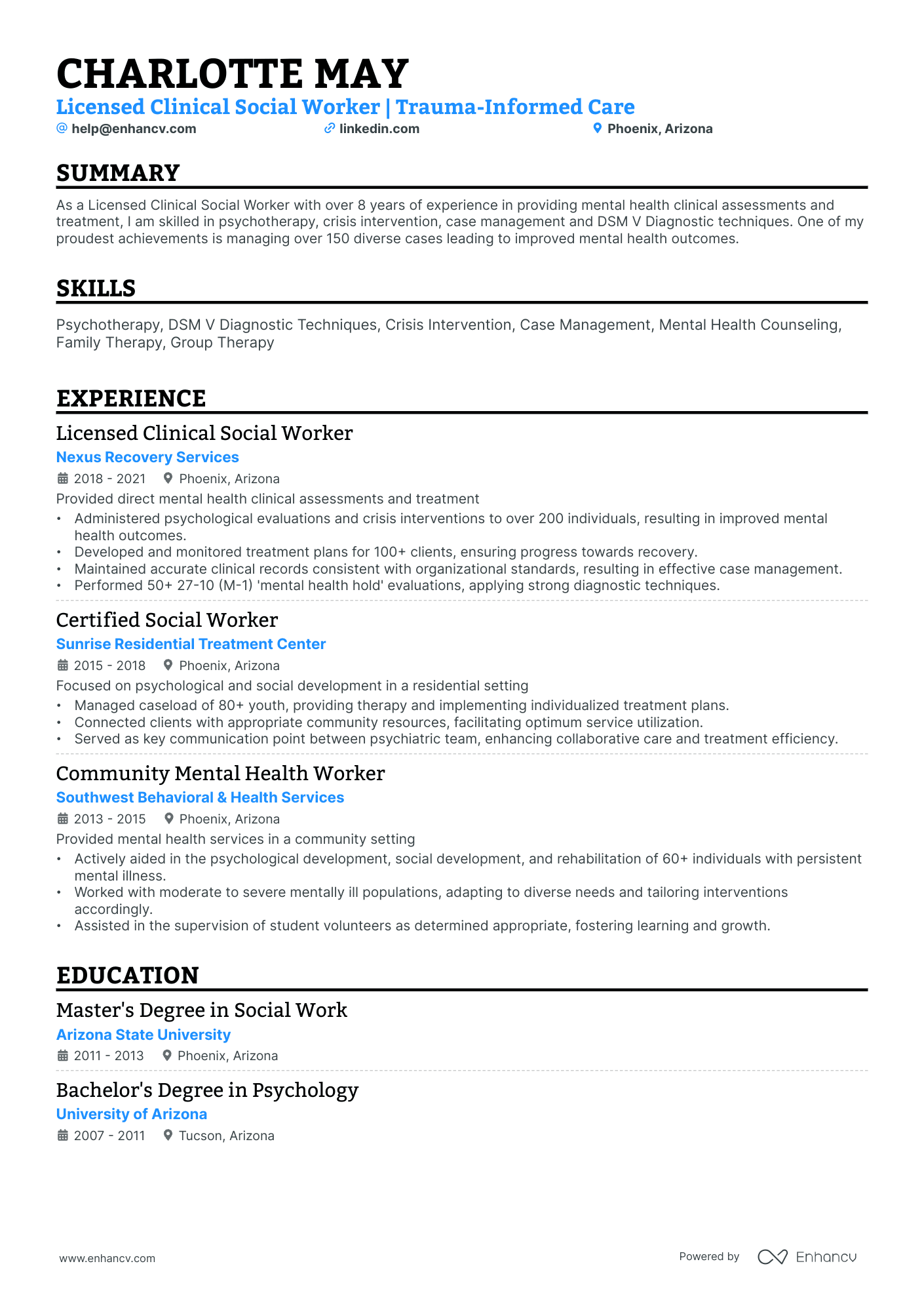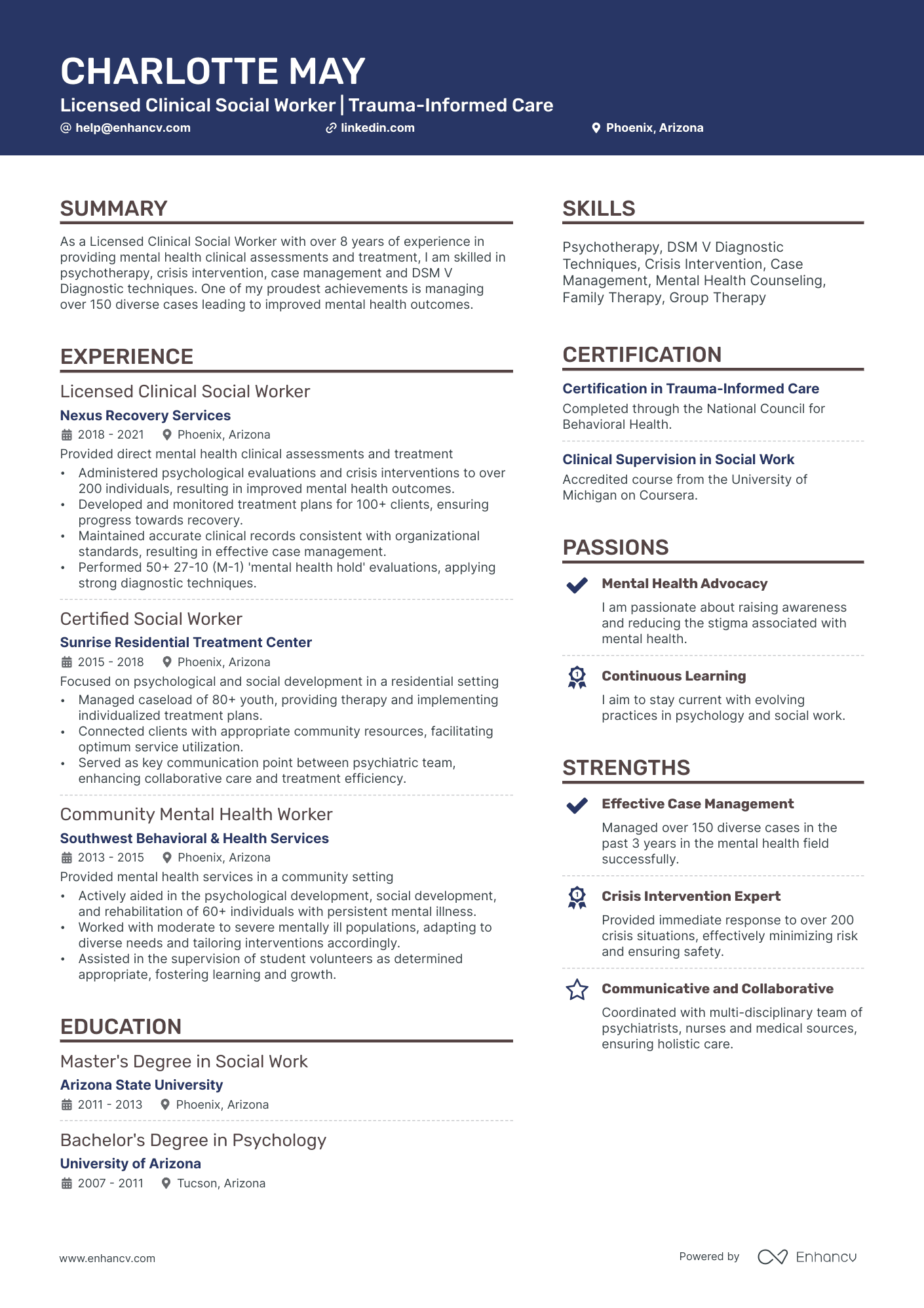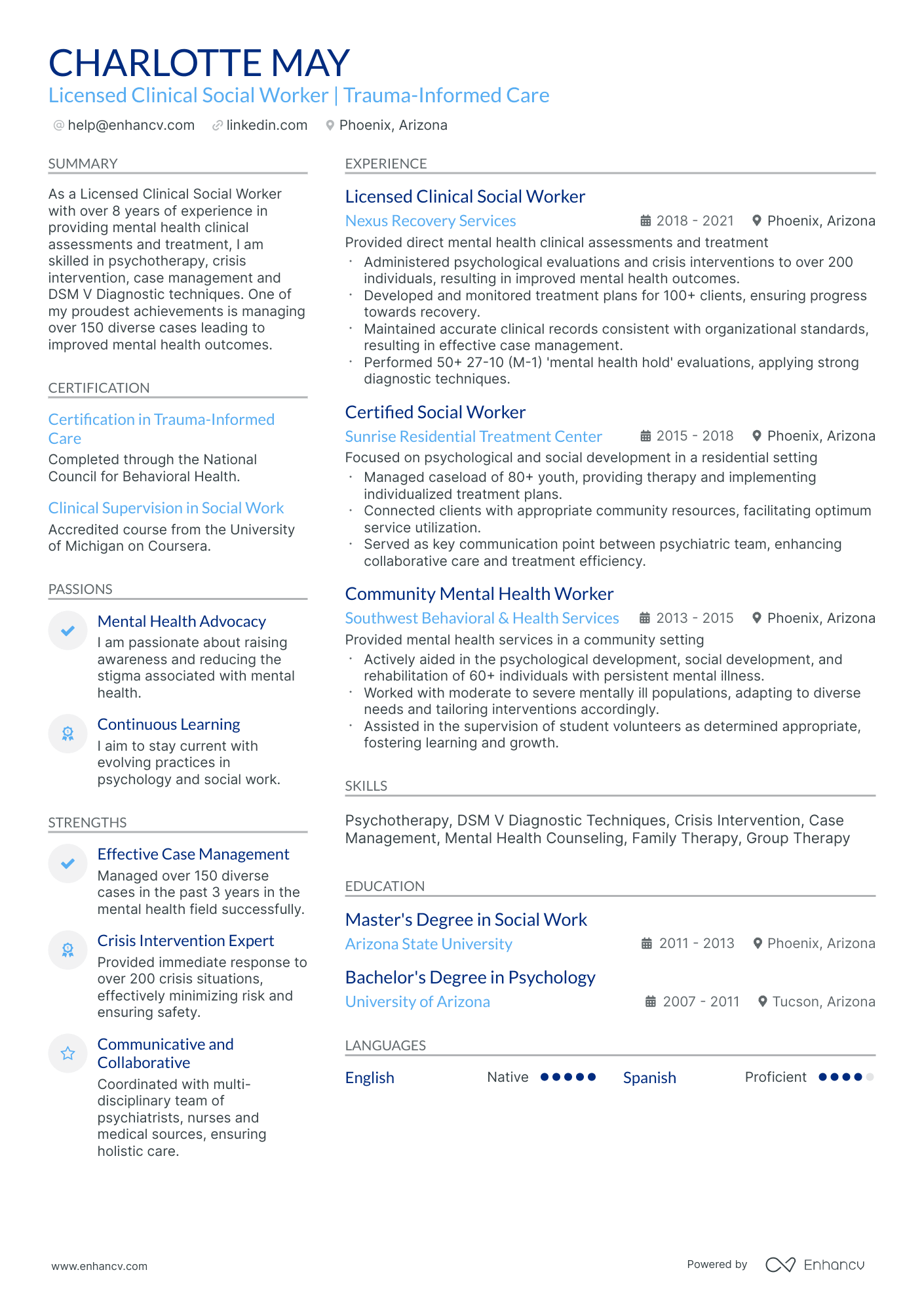Clinical social worker resume guides often fail because they bury clinical impact under generic duties and dense jargon. That matters when a clinical social worker resume must pass ATS screening and win a recruiter's fast scan in a crowded field.
A strong resume shows what changed because you were there. Knowing how to make your resume stand out means highlighting reduced crisis readmissions, improved Patient Health Questionnaire scores, higher attendance in therapy plans, faster discharge coordination, better safety planning compliance, and caseload volume with sustained documentation quality.
Key takeaways
- Quantify clinical outcomes like caseload size, PHQ-9 improvements, and readmission reductions on every resume.
- Use reverse-chronological format for experienced clinical social workers to showcase progression and specialization.
- Tailor experience bullets to mirror each job posting's exact terminology and therapeutic modalities.
- Place licensure credentials like LCSW prominently in your header and summary for faster screening.
- Back every listed skill with a measurable outcome in your experience section.
- Use Enhancv to turn routine clinical tasks into clear, metric-driven resume bullets.
- Stop using AI on your resume once every claim reflects real, verifiable experience.
Job market snapshot for clinical social workers
We analyzed 430 recent clinical social worker job ads across major US job boards. These numbers help you understand employment type trends, skills in demand, experience requirements at a glance.
What level of experience employers are looking for clinical social workers
| Years of Experience | Percentage found in job ads |
|---|---|
| 1–2 years | 9.3% (40) |
| 3–4 years | 2.8% (12) |
| 5–6 years | 0.2% (1) |
| 10+ years | 0.2% (1) |
| Not specified | 87.0% (374) |
Clinical social worker ads by area of specialization (industry)
| Industry (Area) | Percentage found in job ads |
|---|---|
| Healthcare | 66.3% (285) |
| Government | 17.2% (74) |
| Education | 9.8% (42) |
| Finance & Banking | 6.5% (28) |
Top companies hiring clinical social workers
| Company | Percentage found in job ads |
|---|---|
| LifeStance Health | 18.4% (79) |
| State of California | 10.5% (45) |
| University of California System | 6.7% (29) |
| State of New York | 2.6% (11) |
| Brigham and Women's Hospital | 2.3% (10) |
| Children's Hospital Boston | 2.3% (10) |
| Sutter Health | 2.3% (10) |
| Yale-New Haven Health | 2.3% (10) |
Role overview stats
These tables show the most common responsibilities and employment types for clinical social worker roles. Use them to align your resume with what employers expect and to understand how the role is structured across the market.
Day-to-day activities and top responsibilities for a clinical social worker
| Responsibility | Percentage found in job ads |
|---|---|
| Crisis intervention | 11.2% (48) |
| Case management | 8.1% (35) |
| Treatment planning | 8.1% (35) |
| Communication | 7.2% (31) |
| Psychosocial assessment | 6.0% (26) |
| Clinical social work | 5.1% (22) |
| Social work | 5.1% (22) |
| Microsoft office | 4.7% (20) |
| Computer skills | 4.4% (19) |
| Psychosocial assessments | 3.7% (16) |
| Organizational skills | 3.5% (15) |
| Advocacy | 3.3% (14) |
Type of employment (remote vs on-site vs hybrid)
| Employment type | Percentage found in job ads |
|---|---|
| On-site | 71.4% (307) |
| Hybrid | 25.6% (110) |
| Remote | 3.0% (13) |
How to format a clinical social worker resume
Recruiters reviewing clinical social worker resumes prioritize licensure credentials (LCSW, LICSW), clinical specializations, therapeutic modalities, and evidence of caseload management with measurable client outcomes. Choosing the right resume format ensures these signals surface quickly during both automated screening and manual review.
I have significant experience in this role—which format should I use?
Use the reverse-chronological format—it's the strongest choice for experienced clinical social workers because it puts your clinical progression, growing caseload responsibility, and specialization depth front and center. Do:
- Lead each role entry with your scope of practice, including setting type (hospital, community mental health, private practice), population served, and average caseload size.
- Highlight clinical tools and domains—such as CBT, DBT, EMDR, trauma-informed care, DSM-5 diagnostic assessment, and electronic health record (EHR) platforms like TherapyNotes or Epic.
- Quantify outcomes and business impact wherever possible, including client retention rates, treatment plan completion percentages, and program development results.
I'm junior or switching into this role—what format works best?
A hybrid format works best because it lets you lead with relevant clinical skills and training while still showing your work history in chronological order. Do:
- Place a dedicated skills section near the top featuring licensure progress (LSW, MSW), therapeutic modalities studied, and relevant assessment tools.
- Include practicum placements, field internships, supervised clinical hours, and any volunteer crisis-line or case management experience as professional entries.
- Connect each experience to a clear outcome so recruiters see the link between your actions and client or organizational results.
Why not use a functional resume?
A functional resume strips away the timeline and context recruiters need to verify your supervised clinical hours, licensure progression, and hands-on client experience—making it harder for hiring managers to trust your qualifications. A functional format may be acceptable if you're re-entering clinical social work after an extended career gap or transitioning from a related field (such as school counseling or case management), but only if you anchor every listed skill to a specific project, practicum, or measurable outcome rather than presenting skills in isolation.
Once you've established a clean, readable layout, the next step is deciding which sections to include and how to order them for maximum impact.
What sections should go on a clinical social worker resume
Recruiters expect a clinical social worker resume to show licensure, clinical scope, and measurable client outcomes fast. Knowing what to put on a resume helps you prioritize the right information. Use this structure for maximum clarity:
- Header
- Summary
- Experience
- Skills
- Projects
- Education
- Certifications
- Optional sections: Awards, Research, Volunteering
Strong experience bullets should emphasize clinical impact, treatment outcomes, caseload scope, and results across clients, programs, and interdisciplinary teams.
Is your resume good enough?
Drop your resume here or choose a file. PDF & DOCX only. Max 2MB file size.
Now that you’ve outlined the key parts of your resume, the next step is to write your clinical social worker experience section so each role supports those sections with clear, relevant proof.
How to write your clinical social worker resume experience
Your work experience section should highlight the clinical interventions you've delivered, the therapeutic modalities you've applied, and the measurable client outcomes you've achieved. Hiring managers prioritize demonstrated impact—improved patient functioning, reduced crisis episodes, successful treatment completions—over descriptive task lists.
Each entry should include:
- Job title
- Company and location (or remote)
- Dates of employment (month and year)
Three to five concise bullet points showing what you owned, how you executed, and what outcomes you delivered:
- Ownership scope: the caseloads, clinical programs, patient populations, or service lines you were directly accountable for managing and advancing.
- Execution approach: the therapeutic frameworks, evidence-based interventions, assessment instruments, or documentation systems you used to guide treatment planning and clinical decision-making.
- Value improved: the changes you drove in client functioning, treatment adherence, care accessibility, diagnostic accuracy, or risk reduction across your clinical practice.
- Collaboration context: how you coordinated with psychiatrists, case managers, medical teams, community agencies, families, or interdisciplinary treatment teams to deliver integrated care.
- Impact delivered: the outcomes you produced expressed through client progress, program growth, discharge success, or organizational improvements rather than a list of daily responsibilities.
Experience bullet formula
A clinical social worker experience example
✅ Right example - modern, quantified, specific.
Clinical Social Worker (LCSW)
Riverside Community Health Center | Austin, TX
2022–Present
Federally qualified health center delivering integrated primary care and behavioral health services across three clinics.
- Conducted biopsychosocial assessments and DSM-5-TR diagnostic evaluations for a caseload of fifty-five patients per month, documenting in Epic and improving same-day note completion from 62% to 91%.
- Delivered evidence-based treatment using cognitive behavioral therapy, dialectical behavior therapy, and motivational interviewing, increasing PHQ-9 remission rates by 18% over six months for patients enrolled in the depression pathway.
- Coordinated care with primary care physicians, psychiatrists, and care managers via SBAR handoffs and shared treatment plans, reducing emergency department referrals for high-risk patients by 14% year over year.
- Implemented Columbia-Suicide Severity Rating Scale screening and safety planning workflows in Epic with standardized templates, cutting time-to-intervention for positive screens from forty-eight hours to sixteen hours.
- Led weekly multidisciplinary case conferences and consulted with housing and legal aid partners, improving appointment adherence by 22% for patients facing housing insecurity tracked in a population health registry.
Now that you've seen what a strong experience section looks like in practice, let's break down how to adapt yours to match a specific job posting.
How to tailor your clinical social worker resume experience
Recruiters evaluate clinical social worker resumes through both human review and applicant tracking systems (ATS). Tailoring your resume to the job description increases your chances of passing both screening stages.
Ways to tailor your clinical social worker experience:
- Match therapeutic modalities like CBT or DBT named in the posting.
- Mirror the exact terminology used for treatment planning processes.
- Reflect caseload size or client outcome metrics the employer prioritizes.
- Highlight experience with electronic health record systems they specify.
- Emphasize compliance with licensing standards or ethical guidelines mentioned.
- Include relevant population focus such as pediatric or geriatric clients.
- Align your documentation practices with accreditation frameworks they reference.
- Reference interdisciplinary collaboration models described in the job listing.
Tailoring means aligning your real clinical achievements with the employer's stated requirements, not inserting keywords where they don't genuinely belong.
Resume tailoring examples for clinical social worker
| Job description excerpt | Untailored | Tailored |
|---|---|---|
| Provide trauma-informed care using EMDR and CBT to adults with PTSD in an outpatient behavioral health setting | Provided therapy to clients dealing with various mental health issues | Delivered trauma-informed individual therapy using EMDR and CBT to a caseload of 25+ adults diagnosed with PTSD in an outpatient behavioral health clinic, contributing to a 40% reduction in PCL-5 scores over six months |
| Conduct psychosocial assessments and develop individualized treatment plans in collaboration with a multidisciplinary team including psychiatrists and case managers | Worked with other professionals to help clients and created treatment plans | Conducted comprehensive psychosocial assessments and co-developed individualized treatment plans with psychiatrists and case managers, coordinating care for 60 clients across acute and chronic mental health needs |
| Facilitate group therapy sessions for adolescents using DBT skills training within a community mental health center | Led group sessions for different populations on various topics | Facilitated weekly DBT skills training groups for adolescents aged 13–17 at a community mental health center, tracking skill acquisition through diary cards and achieving an 85% session attendance rate across a 12-week cycle |
Once your experience aligns with the role’s needs, quantify your clinical social worker achievements to show the scope and impact of your work.
How to quantify your clinical social worker achievements
Quantifying your achievements proves clinical impact and operational value. Focus on caseload volume, time to access care, patient-reported outcomes, safety and compliance metrics, and discharge results across programs and settings.
Quantifying examples for clinical social worker
| Metric | Example |
|---|---|
| Caseload volume | "Managed an average caseload of thirty-two clients per month across outpatient and crisis services while maintaining documentation completion within forty-eight hours in Epic." |
| Access time | "Reduced intake-to-first-appointment time from fourteen days to seven days by redesigning triage criteria and adding a weekly group orientation session." |
| Clinical outcomes | "Improved PHQ-9 scores by an average of five points over eight weeks for twenty-four clients using measurement-based care and CBT-informed treatment plans." |
| Risk reduction | "Cut safety-plan gaps from twelve percent to three percent by auditing charts weekly and standardizing Columbia Suicide Severity Rating Scale documentation." |
| Discharge success | "Increased successful discharges to community supports from sixty-two percent to seventy-eight percent by coordinating warm handoffs with five partner agencies." |
Turn your everyday tasks into measurable, recruiter-ready resume bullets in seconds with Enhancv's Bullet Point Generator.
Once you've crafted strong bullet points for your experience section, you'll want to apply that same precision to presenting your hard and soft skills effectively.
How to list your hard and soft skills on a clinical social worker resume
Your skills section shows your clinical scope and how you deliver safe, compliant care—recruiters and applicant tracking systems (ATS) scan this section to confirm role fit and keywords, so aim for a balanced mix of hard skills and job-specific soft skills. clinical social worker roles require a blend of:
- Product strategy and discovery skills.
- Data, analytics, and experimentation skills.
- Delivery, execution, and go-to-market discipline.
- Soft skills.
Your skills section should be:
- Scannable (bullet-style grouping).
- Relevant to the job post.
- Backed by proof in experience bullets.
- Updated with current tools.
Place your skills section:
- Above experience if you're junior or switching careers.
- Below experience if you're mid/senior with strong achievements.
Hard skills
- Psychosocial assessments
- Diagnostic formulation, DSM-5-TR
- Treatment planning, SMART goals
- Evidence-based therapy: CBT, DBT, MI
- Trauma-informed care
- Crisis intervention, suicide risk assessment
- Safety planning, lethal means counseling
- Clinical documentation, progress notes
- Electronic health records, Epic, Cerner
- Care coordination, case management
- Medicaid, Medicare, insurance authorization
- HIPAA compliance
Soft skills
- Build therapeutic rapport quickly
- Set and maintain boundaries
- De-escalate high-stress situations
- Communicate risk clearly to teams
- Coordinate across multidisciplinary care
- Navigate difficult family dynamics
- Deliver culturally responsive care
- Make sound clinical judgments
- Prioritize caseload and follow-ups
- Advocate for client access to services
- Coach clients through behavior change
- Handle conflict with professionalism
How to show your clinical social worker skills in context
Skills shouldn't live only in a bulleted list on your resume. Browse examples of resume skills to see how clinical competencies can be woven throughout your document.
They should be demonstrated in:
- Your summary (high-level professional identity)
- Your experience (proof through outcomes)
Here's what this looks like in practice.
Summary example
Licensed clinical social worker with 12 years in community behavioral health. Skilled in CBT, trauma-focused care, and motivational interviewing. Reduced client readmission rates by 31% through collaborative, evidence-based treatment planning across multidisciplinary teams.
- Reflects senior-level experience clearly
- Names specific therapeutic methods
- Highlights a measurable client outcome
- Conveys empathy through collaborative language
Experience example
Senior Clinical Social Worker
Lakeview Behavioral Health Partners | Portland, OR
March 2018–Present
- Delivered CBT and DBT interventions to a caseload of 45+ adults, improving treatment completion rates by 27% over two years.
- Partnered with psychiatrists and case managers using coordinated care plans, reducing emergency crisis referrals by 19%.
- Implemented trauma-informed screening protocols in the EHR system, cutting intake assessment time by 35% across the clinic.
- Every bullet includes measurable proof
- Skills appear naturally within achievements
Once you’ve tied your clinical social worker strengths to real outcomes and settings, the next step is structuring a resume that does the same when you don’t have formal experience yet.
How do I write a clinical social worker resume with no experience
Even without full-time experience, you can demonstrate readiness through building a resume without work experience that leverages:
- Supervised clinical practicum caseload
- Internship in behavioral health clinic
- Crisis hotline shift documentation
- Community needs assessment project
- Evidence-based group facilitation training
- Intake assessments and biopsychosocials
- Treatment planning under supervision
- Case management for community clients
Focus on:
- Assessment, diagnosis, and documentation
- Evidence-based interventions used in practice
- Client outcomes and measurable results
- Compliance with privacy and ethics
Resume format tip for entry-level clinical social worker
Use a combination resume format because it highlights clinical social worker skills first, while still showing supervised experience and training. Do:
- Lead with a clinical social worker skills summary.
- List practicum and internships as experience.
- Add methods used, like safety planning.
- Quantify caseload, sessions, and outcomes.
- Include documentation systems you used.
- Completed twenty biopsychosocial intakes in a supervised clinical practicum, documented in an electronic health record, and reduced missing fields by 30%.
Once you've shaped your resume around transferable strengths rather than direct experience, presenting your education effectively becomes your next opportunity to demonstrate relevant qualifications.
How to list your education on a clinical social worker resume
Your education section lets hiring teams confirm you hold the required degrees and training. It validates foundational knowledge essential for any clinical social worker role.
Include:
- Degree name
- Institution
- Location
- Graduation year
- Relevant coursework (for juniors or entry-level candidates)
- Honors & GPA (if 3.5 or higher)
Skip month and day details—list the graduation year only.
Here's a strong education entry tailored for a clinical social worker resume.
Example education entry
Master of Social Work (MSW)
University of Michigan, Ann Arbor, MI
Graduated 2021
GPA: 3.8/4.0
- Relevant coursework: Clinical Assessment Methods, Psychopathology, Trauma-Informed Care, Evidence-Based Practice with Diverse Populations
- Honors: Dean's List, inducted into Phi Alpha Honor Society for Social Work
How to list your certifications on a clinical social worker resume
Certifications on your resume show your commitment to learning, proficiency with clinical tools, and current industry relevance as a clinical social worker. They help employers trust your clinical judgment, ethics, and readiness to support clients.
Include:
- Certificate name
- Issuing organization
- Year
- Optional: credential ID or URL
- List certifications below education when your degree is recent and your certifications are older or less relevant to your clinical social worker focus.
- List certifications above education when they are recent, highly relevant, or required for your clinical social worker role in your target setting.
Best certifications for your clinical social worker resume
- Licensed Clinical Social Worker (LCSW)
- Certified Clinical Trauma Professional (CCTP)
- Certified Alcohol and Drug Counselor (CADC)
- Applied Suicide Intervention Skills Training (ASIST)
- Dialectical Behavior Therapy (DBT) Certification
- Eye Movement Desensitization and Reprocessing (EMDR) Training Certificate
- Certified Case Manager (CCM)
Once you’ve positioned your credentials so they’re easy to verify, you can write your clinical social worker resume summary to highlight those qualifications upfront and frame the rest of your experience.
How to write your clinical social worker resume summary
Your resume summary is the first thing a recruiter reads when evaluating your clinical social worker application. A strong opening signals relevant expertise and gives hiring managers a reason to keep reading.
Keep it to three to four lines, with:
- Your title and total years of clinical social work experience.
- Practice setting or population served, such as community mental health or pediatric care.
- Core competencies like CBT, DBT, trauma-informed care, or crisis intervention.
- One or two measurable achievements, such as caseload size or client outcome improvements.
- Interpersonal strengths tied to real results, like collaboration that improved treatment plan adherence.
PRO TIP
As a clinical social worker, focus on your licensure status, therapeutic modalities, and direct client impact. Highlight specific populations you've served and measurable outcomes from your caseload. Avoid vague phrases like "passionate about helping others" or "strong communicator." Instead, show those qualities through concrete results.
Example summary for a clinical social worker
Licensed clinical social worker with four years of experience in community mental health. Skilled in CBT and crisis intervention across a 45-client caseload. Improved treatment adherence rates by 22% through coordinated, trauma-informed care planning.
Optimize your resume summary and objective for ATS
Drop your resume here or choose a file.
PDF & DOCX only. Max 2MB file size.
Now that you've crafted a summary that highlights your clinical expertise, make sure the header above it presents your professional contact details correctly.
What to include in a clinical social worker resume header
A resume header is the top section with your key identifiers, and it boosts visibility, credibility, and recruiter screening for a clinical social worker role.
Essential resume header elements
- Full name
- Tailored job title and headline
- Location
- Phone number
- Professional email
- GitHub link
- Portfolio link
A LinkedIn link helps recruiters verify experience quickly and supports screening.
Do not include photos on a clinical social worker resume unless the role is explicitly front-facing or appearance-dependent.
Match your header job title to the posting and include your clinical license in the headline to reduce screening delays.
Example
Clinical social worker resume header
Jordan M. Rivera, LCSW
Clinical social worker | Trauma-informed therapy, crisis intervention, and care coordination
Chicago, IL
(312) 555-01XX
jordan.rivera@enhancv.com
github.com/jordanrivera
jordanrivera.com
linkedin.com/in/jordanrivera
Once your contact details and credentials are easy to find at the top, add optional sections to highlight supporting qualifications and experience that strengthen your clinical social worker resume.
Additional sections for clinical social worker resumes
Adding extra sections helps you stand out when your core qualifications match other candidates, showcasing unique strengths relevant to clinical practice. For example, listing language skills on your resume can highlight your ability to serve diverse client populations.
- Languages
- Publications
- Professional affiliations
- Volunteer experience
- Continuing education
- Conference presentations
Once you've strengthened your resume with relevant additional sections, it's worth pairing it with a well-crafted cover letter to make an even stronger impression.
Do clinical social worker resumes need a cover letter
A cover letter isn't always required for a clinical social worker, but it often helps. If you're wondering what is a cover letter and when it matters most, it makes the biggest difference in competitive roles or when hiring managers expect one. It also helps when your resume needs context.
Use a cover letter to add value in these situations:
- Explain role and team fit by connecting your setting experience to the population, acuity, and care model the clinical social worker role supports.
- Highlight one or two relevant projects or outcomes, such as reduced no-show rates, improved discharge planning, or stronger care coordination across teams.
- Show understanding of the organization's users and business context, including referral pathways, payer constraints, documentation standards, and interdisciplinary workflows.
- Address career transitions or non-obvious experience by mapping transferable skills to clinical social worker requirements, including assessment, crisis intervention, and collaboration.
Drop your resume here or choose a file.
PDF & DOCX only. Max 2MB file size.
Even when you decide a cover letter won’t add value for your application, you can still strengthen your resume faster and more consistently by using AI to improve your clinical social worker resume.
Using AI to improve your clinical social worker resume
AI can sharpen your resume's clarity, structure, and impact. It helps you find stronger phrasing and tighten wordy bullets. But overuse strips authenticity fast. Once your content is clear and role-aligned, step away from AI. If you're curious about which AI is best for writing resumes, start with tools that preserve your authentic voice.
Here are 10 prompts to strengthen specific sections of your clinical social worker resume:
Strengthen your summary
Quantify experience bullets
Tighten wordy bullets
Align skills section
Improve action verbs
Refine certifications section
Tailor education details
Clarify project descriptions
Remove filler language
Match job posting language
Conclusion
A strong clinical social worker resume shows measurable outcomes, role-specific skills, and a clear structure. Use metrics to prove impact, highlight clinical assessment, crisis intervention, and care coordination, and keep sections easy to scan.
Hiring teams need clinical social workers who can deliver results and document them clearly. A focused summary, targeted experience, and consistent formatting show you’re ready for today’s roles and tomorrow’s expectations.
